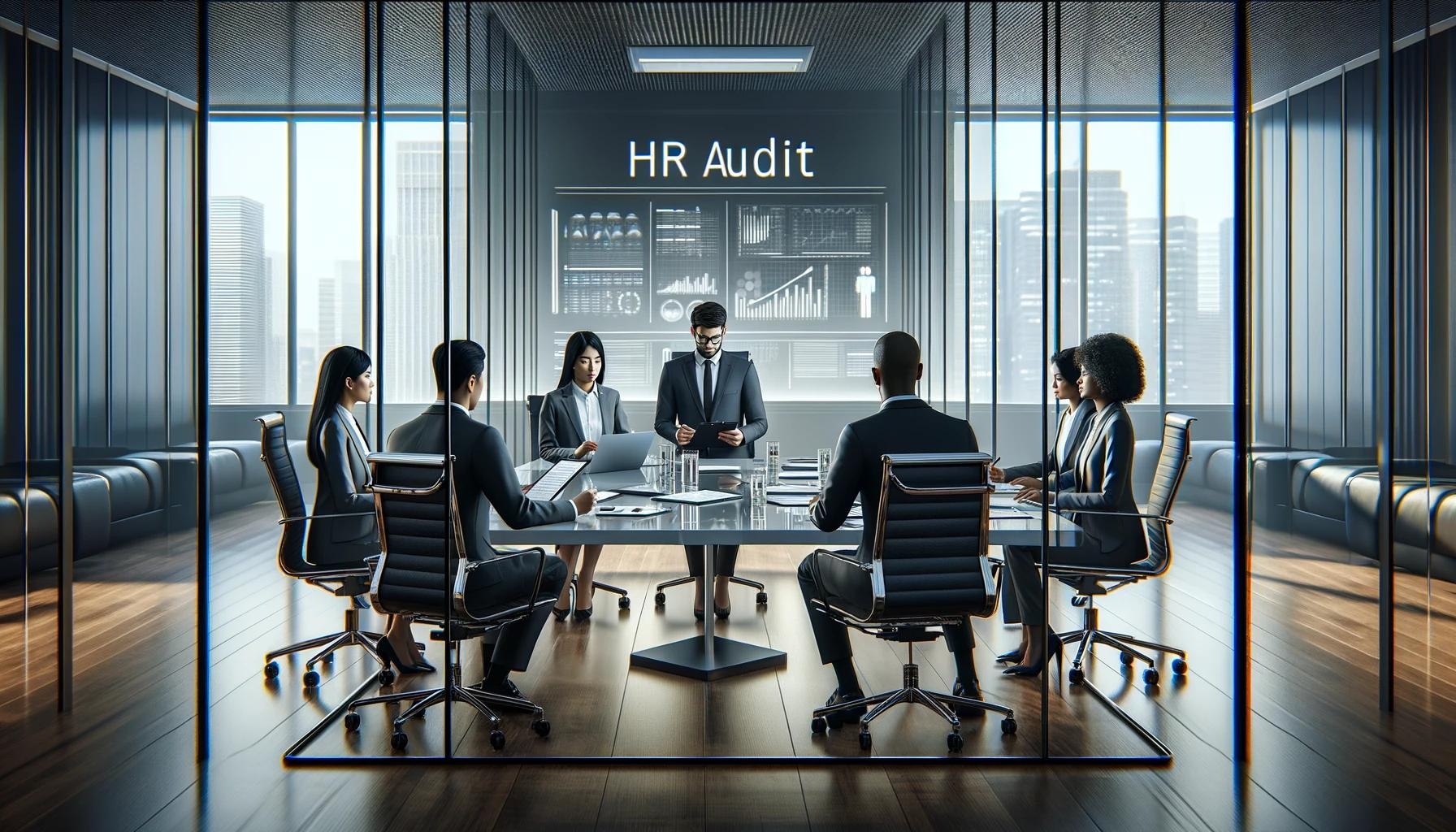HR compliance is a critical aspect of managing a workforce, ensuring that a company adheres to legal standards and regulations while fostering a fair and safe work environment. This guide provides essential practices for HR professionals to maintain compliance effectively. The vital role of HR audits cannot be overstated in this process, as they help identify and rectify potential compliance issues before they escalate.
Key Takeaways
- Understand and stay current with both local and international laws affecting HR practices.
- Implement and consistently update clear HR policies and procedures.
- Regularly conduct audits and trainings to ensure ongoing compliance.
1. Stay Informed

Staying informed is crucial for maintaining HR compliance. Achieving company-wide compliance requires that you stay informed of new legislation and updates to existing laws that apply to your business. Regularly checking the websites of relevant government agencies responsible for labor and employment regulations is essential. These websites often provide updates on new laws, changes in regulations, and guidance documents to help understand and comply with HR requirements.
2. Develop and Communicate Policies

Developing clear, comprehensive policies is crucial for maintaining HR compliance. These policies should be aligned with legal requirements and industry standards, covering various aspects such as code of conduct, health and safety, and leave and attendance. Effective communication of these policies ensures that all employees understand their responsibilities and the company’s expectations. This not only promotes a transparent and ethical work environment but also simplifies workforce management.
3. Conduct Regular Audits

Conducting regular audits is crucial for ensuring HR compliance within an organization. These audits assess various HR practices and help identify areas that may need improvement to stay compliant. Key areas to review include employee classification, record-keeping, wage and hour practices, benefits administration, and safety protocols. Regular audits not only help in maintaining compliance but also prepare the organization for any external audits by regulatory authorities.
4. Practice Policy Documentation

Proper documentation of HR policies and practices is crucial for maintaining compliance and ensuring that all employees have access to necessary information. It is essential that these documents are not only thorough but also easily accessible and understandable by everyone within the organization. This includes everything from employment and payroll records to safety and training guidelines. By maintaining a clear and comprehensive documentation system, organizations can demonstrate compliance and protect themselves in the event of audits or legal disputes.
HR Compliance and Data Security
HR compliance extends beyond adhering to laws and policies; it also encompasses data security. Protecting employee data is paramount in today’s digital age. HR departments must ensure that sensitive information is stored securely and access is restricted to authorized personnel only. Implementing robust data protection measures, such as encryption and regular security audits, helps safeguard against data breaches and ensures compliance with data privacy regulations.
5. Stay Proactive About Compliance

By following best practices and staying proactive in monitoring the regulatory landscape, HR teams can effectively manage compliance responsibilities, minimize risks, and create a positive and compliant work environment. Leveraging the capabilities of cutting-edge HR compliance software can be a strategic move to stay ahead in the compliance game, ensuring that your organization is always prepared and up-to-date with the latest compliance requirements.
6. Pay Attention to New and Updated Laws

HR leaders must proactively follow federal, state, and local legislation—both new laws and updates to existing ones—and pay attention to laws outside the company’s immediate jurisdiction as well. For example, if the company recruits in states with pay transparency laws, recruiters need to add the salary range to the job listing. Staying informed by regularly checking the websites of relevant government agencies responsible for labor and employment regulations is crucial. These websites often provide updates on new laws, changes in regulations, and guidance documents to help understand and comply with HR requirements.
7. The Employee Handbook

The employee handbook serves as a crucial resource for both employers and employees, outlining the organization’s policies, procedures, and benefits. It is essential for ensuring that all employees are aware of and understand the company’s expectations and their own responsibilities. A well-crafted employee handbook can significantly reduce the risk of non-compliance by providing clear guidelines on various aspects such as Equal Employment Opportunity, workplace safety, and disciplinary actions. Regular updates and thorough communication of any changes are vital to maintain its effectiveness in compliance management.
8. Use HR Compliance Software

In the realm of HR compliance, leveraging advanced HR compliance software is a strategic move that can significantly enhance an organization’s ability to stay compliant. These tools offer centralized storage for crucial documents such as employee records, contracts, and compliance-related documents, which simplifies document management. Moreover, HR software is instrumental in tracking and monitoring compliance tasks, deadlines, and certifications. It can generate alerts and reminders for critical actions like training renewals, performance evaluations, and license expirations. By automating these processes, HR compliance software not only reduces the risk of human error but also ensures that the organization remains proactive and up-to-date with compliance requirements.
9. Monitor Employee Rights and Responsibilities

Monitoring employee rights and responsibilities is crucial for maintaining a compliant and ethical workplace. Effective communication is key in ensuring that all employees are aware of their rights and responsibilities. Regular training sessions and accessible resources help employees understand how to report non-compliance and contribute to a safe working environment. It is essential for HR to empower employees to speak up about suspicious activities, ensuring that ethical behavior is maintained across all levels of the organization.
10. Ensure Proper Record Keeping

Ensuring proper record keeping is crucial for any organization to maintain compliance with legal and regulatory requirements. Accurate and up-to-date documentation of employment, payroll, benefits, safety, and training records not only demonstrates compliance but also serves as vital evidence in case of audits or legal disputes. It is essential for HR staff to be familiar with the company’s data storage policies and ensure that all records are accessible and stored appropriately. This practice supports transparency and accountability in employment practices, building trust between employers and employees.
Conclusion
In conclusion, effective HR compliance management is essential for maintaining a legally compliant and productive workplace. By staying informed, developing clear policies, conducting regular audits, and embracing a culture of compliance, organizations can navigate the complex landscape of HR regulations effectively. Fostering DEI (Diversity, Equity, and Inclusion) in HR practices is also pivotal in creating a fair and inclusive work environment. It’s crucial for HR professionals to be proactive and vigilant in their compliance efforts to minimize risks and ensure a fair work environment for all employees. Leveraging modern tools and resources can further enhance the efficiency and accuracy of compliance practices, keeping your organization ahead in the ever-evolving regulatory environment.
Frequently Asked Questions
What is HR Compliance?
HR compliance involves adhering to a wide range of laws and regulations that govern how companies manage their employees. This includes everything from hiring practices and workplace safety to employee benefits and termination procedures.
Why is Staying Informed Important for HR Compliance?
Staying informed is crucial because employment laws and regulations can change frequently. Being up-to-date ensures that HR practices are compliant and minimizes the risk of legal issues.
How Can HR Compliance Software Help?
HR compliance software helps organizations stay compliant by automating the management of employee data, tracking changes in laws, and providing tools for regular audits and reporting. This technology can significantly reduce the risk of non-compliance and improve overall HR efficiency.











